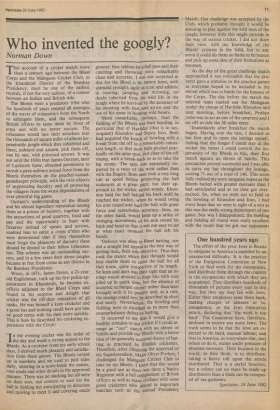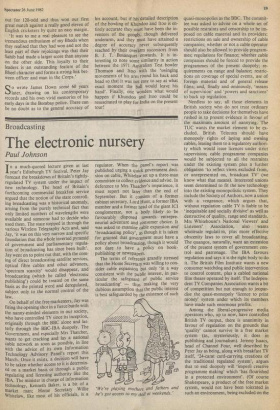Who invented the googly?
Norman Down
This account of a cricket match more than a century ago between the Bheel Corps and the Malegaon Cricket Club, in the Khandeish District of the Bombay Presidency, must be one of the earliest records, if not the very earliest, of a contest between an Indian and British side.
The Bheels were a predatory tribe who for hundreds of years resisted all attempts of the waves of conquerors from the North to subjugate them, and the subsequent British efforts to tame them by force of arms met with no better success. The tribesmen would lure their attackers into the thousands of square miles of almost im- penetrable jungle which they inhabited and there, unheard and unseen, pick them off, one by one, with poisoned arrows. It was not until the 1830s that James Outram, later of Lucknow fame, obtained permission to recruit a para-military armed force from the Bheels themselves on the poacher-turned- gamekeeper principle, with the twin objects of suppressing dacoitry and of protecting the villagers from the worst depredations of over-plentiful big game.
Outram's understanding of the Bheels and his almost legendary reputation among them as a prince of hunters, together with the attractions of good quarters, food and pay and the opportunity to hunt with firearms instead of spears and arrows, enabled him to enlist a corps d'elite who were determined that if they themselves must forgo the pleasures of dacoitry these should be denied to their fellow tribesmen too. The scheme was an outstanding suc- cess, and in a few years their dense jungles became as free from crime as any district in the Bombay Presidency.
When, in 1871, James Down, a 21-year- old Englishman, took up his first police ap- pointment in Khandeish, he became ex- officio adjutant to the Bheel Corps and found to his surprise and delight that cricket was the off-duty relaxation of all ranks, He was himself a keen cricketer and a good bat and nothing could have got him on good terms with his men more quickly. This is how he described his cricketing ex- periences with the Corps:
'T n the evening cricket was the order of 1 the day and made a strong appeal to the Bheels. As a cricketer from my early school days, I derived much pleasure and satisfac- tion from these games. The Bheels turned Up in numbers and we used to pick sides daily, entering in a score-book the names, runs made and other details in the approved manner. There was no slacking but all were on their toes, not content to wait for the ball in fielding but anticipating its direction and moving to meet it and covering much ground; they seldom let a ball pass and their catching and throwing ,were remarkably clean and accurate. I was not surprised at this for the Bheel is by nature keen, with splendid eyesight, agile as a cat and athletic in running, jumping and throwing, no doubt inherited from his wild life in the jungle where he survived by the accuracy of his shooting with bow and arrow and the use of his spear in hunting wild beasts.
'More remarkable, perhaps, than the fielding of the Bheels was their bowling, in particular that of Havildar (that is to say, sergeant) Khundoo and Sepoy Itoo. Both had acquired the knack of bowling with a break from the off to a remarkably consis- tent length, so that most balls pitched prac- tically on the same spot, just clear of the off stump, with a break-back so as to take the leg stump. The spin was apparently im- parted by a twist of the wrist rather than with the fingers. Both men took a very long run at speed before projecting the ball underarm at a great pace, but their ap- proach to the wicket varied widely. Khun- doo held the ball behind his back until he reached the wicket, when he would swing his arm round and hurl the ball with great force and remarkable accuracy. Itoo, on the other hand, would keep up a series of swinging movements of his arm round his back and head so that it was not easy to see at what exact moment the ball left his hands.
'Defence was alien to Bheel batting, nor did a straight bat appeal as the best way of getting runs, their sole objective. Thus they took the stance which they thought would best enable them to smite the ball for all they knew, quite irrespective of its length. So keen and alert was their sight that an in- nings would abound in huge hits with runs piled up in quick time, but the absence of accepted technique sooner rather than later brought with it its penalty and, as a rule, the innings could best be described as short and merry. Nevertheless, the bowling and fielding were so excellent as to more than counterbalance defective batting.
'It occurred to me that it would give a healthy stimulus to
our cricket if I could ar- range an "out" m- atch with an eleven of Sahibs and provide our Bheels with a better idea of the generally accepted theory of bat- ting as practised by English cricketers. Therefore, after obtaining the approval of my Superintendent, major Oliver Probyn, I challenged the Malegaon Cricket Club to take on my Bheels. I knew that this would be a good test as there was there a Native Regiment with a full complement of British officers as well as many civilians with some good cricketers who played in important matches such as the annual Presidency
Match. Our challenge was accepted by the Club, which probably thought it would be amusing to play against the wild men of the jungle, however little this might provide in the way of serious cricket. I did not share their view, with my knowledge of the Bheels' prowess in the field, but in any event it could do them no harm to be beaten and pick up some idea of their limitations as batsmen.
'As the day of the great challenge match approached it was noticeable that the pro- spect gave a stimulus to the practice games as everyone hoped to be included in the eleven which was to battle for the honour of the Corps. The day before the match the selected team started out for Malegaon under the charge of Havildar Khundoo and next morning, before breakfast, Probyn (who was to act as one of the umpires) and I set off to ride the 30 miles there.
'Immediately after breakfast the match began. Having won the toss, I decided to bat first and to open the innings myself, feeling that the longer I could stay at the wicket the better I could control the im- petuosity of my Bheels in this, their first match against an eleven of Sahibs. This precaution proved successful and I was able to carry my bat throughout the innings, scoring 71 out of a total of 140. This score fully realised my most sanguine hopes as the Bheels batted with greater restraint than I had anticipated and at no time got over- excited. So, when we went out to field to the bowling of Khundoo and Itoo, I had every hope that we were in sight of a win as this was the really strong department of our game. Nor was I disappointed; the bowling and fielding all round were really excellent with the result that we got our opponents out for 120-odd and thus won our first great match against a really good eleven of English cricketers by quite an easy margin.
'It was to me a real pleasure to see the tremendous enthusiasm of my Bheels when they realised that they had won and not the least part of their rejoicings was that their Sahib had made a larger score than anyone on the other side. This loyalty to their leaders is an outstanding feature of the Bheel character and forms a strong link bet- ween officer and man in the Corps.'
o wrote James Down some 60 years later, drawing on his contemporary records and his own vivid memories of his early days in the Bombay police. There can be no doubt as to the general accuracy of his account, but if his detailed description of the bowling of Khundoo and Itoo is en- tirely accurate they must have been the in- ventors of the googly, though delivered underarm, and they must have attained a degree of accuracy never subsequently reached by their overarm successors from B. J. T. Bosanquet onwards. It is in- teresting to note some similarity in action between the 1971 Australian Test bowler Thomson and Itoo with the 'swinging movements of his arm round his back and head so that it was not easy to say at what exact moment the ball would leave his hand'. Finally, one wonders what would happen if Khundoo and Itoo could be resuscitated to play for India on the present tour!























































 Previous page
Previous page